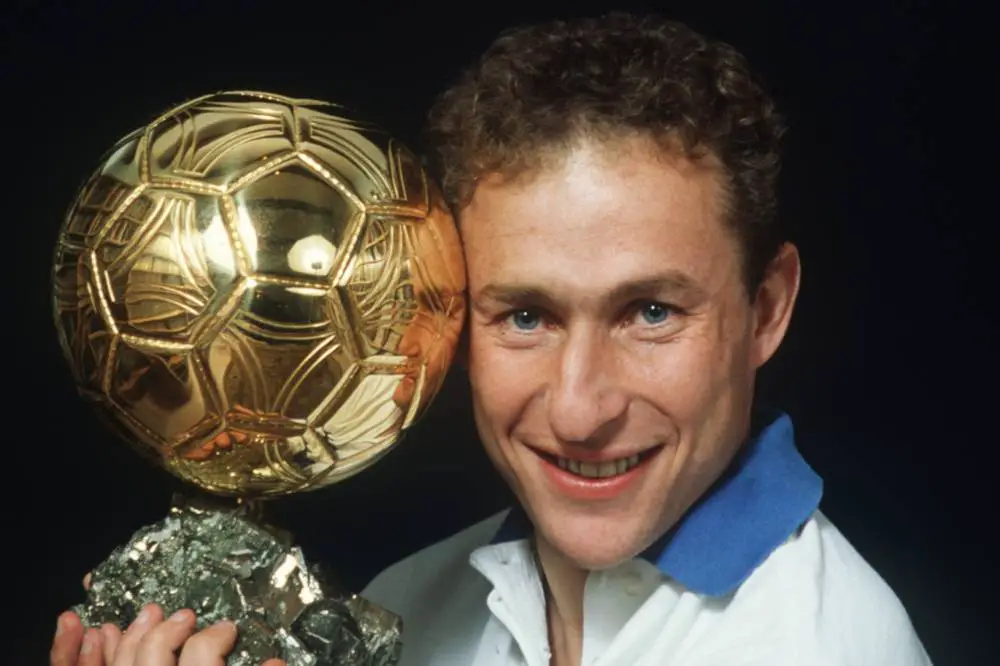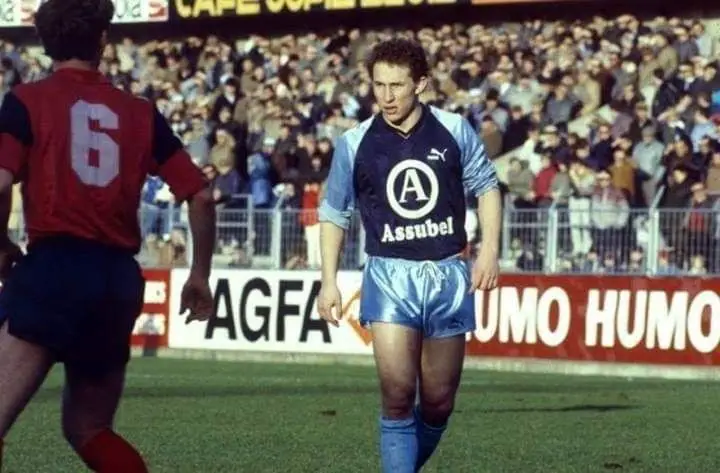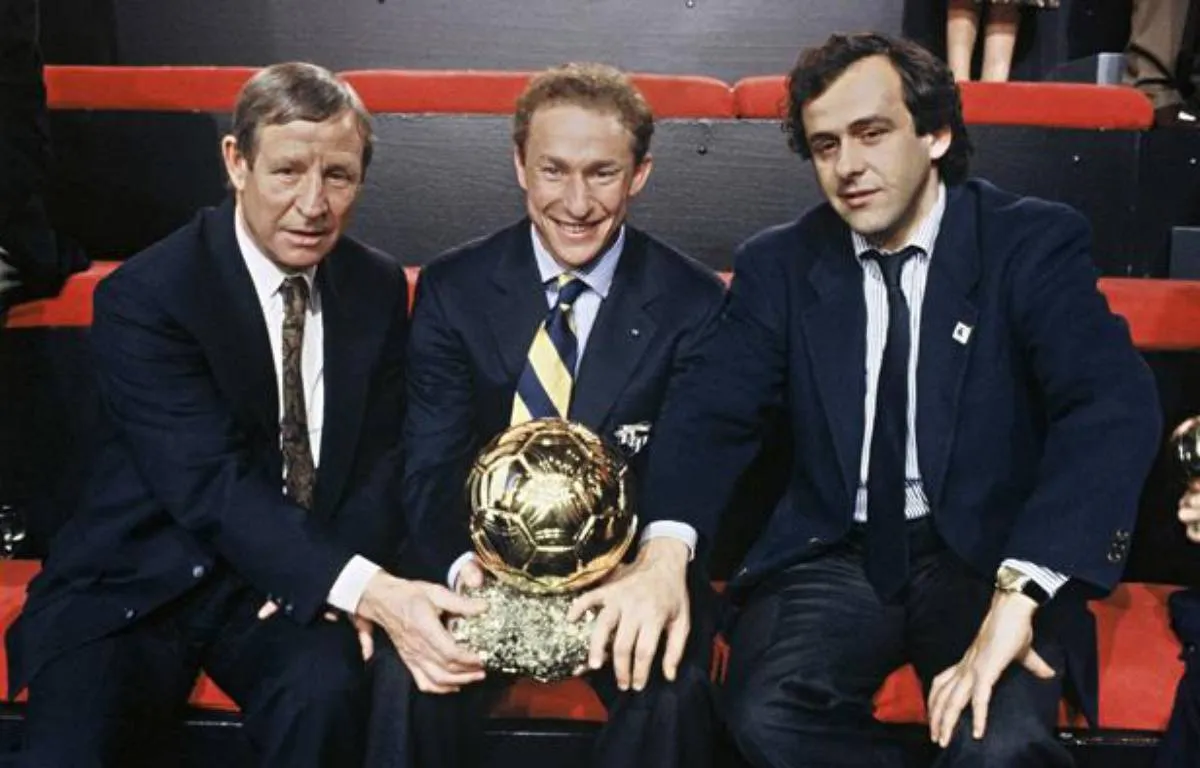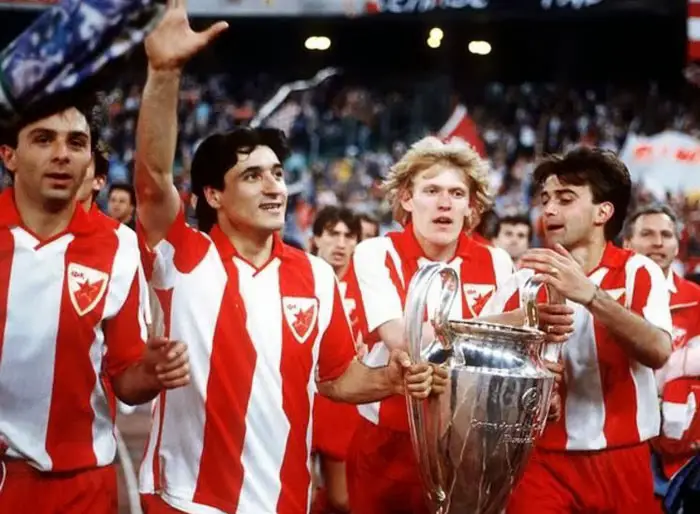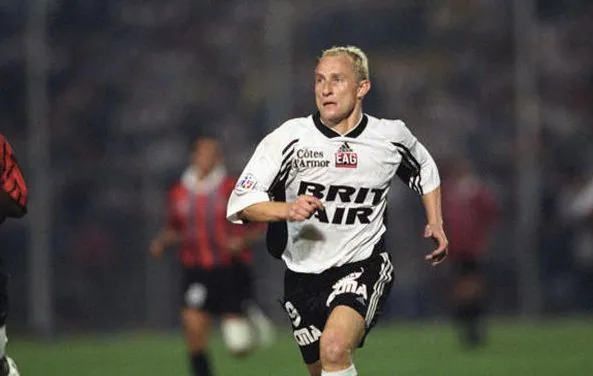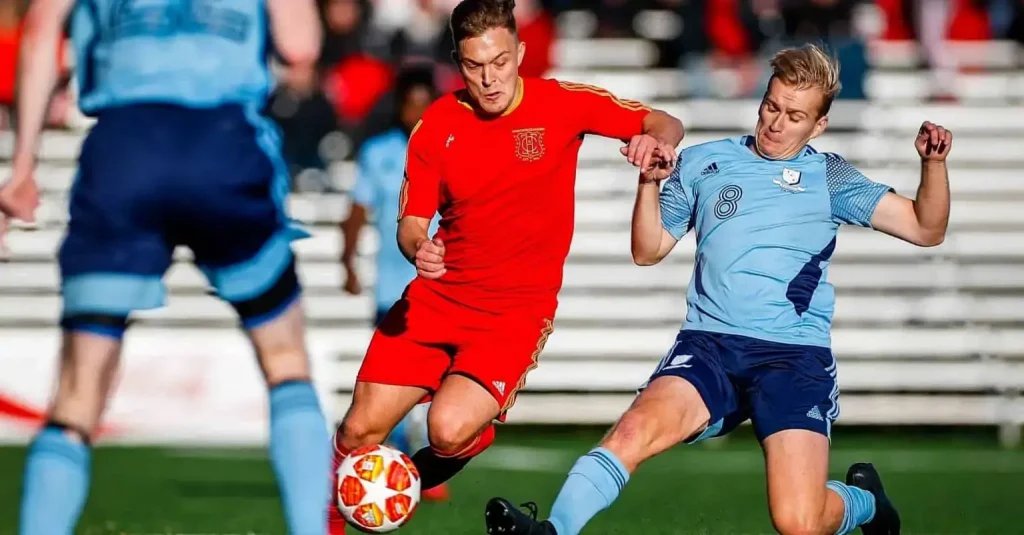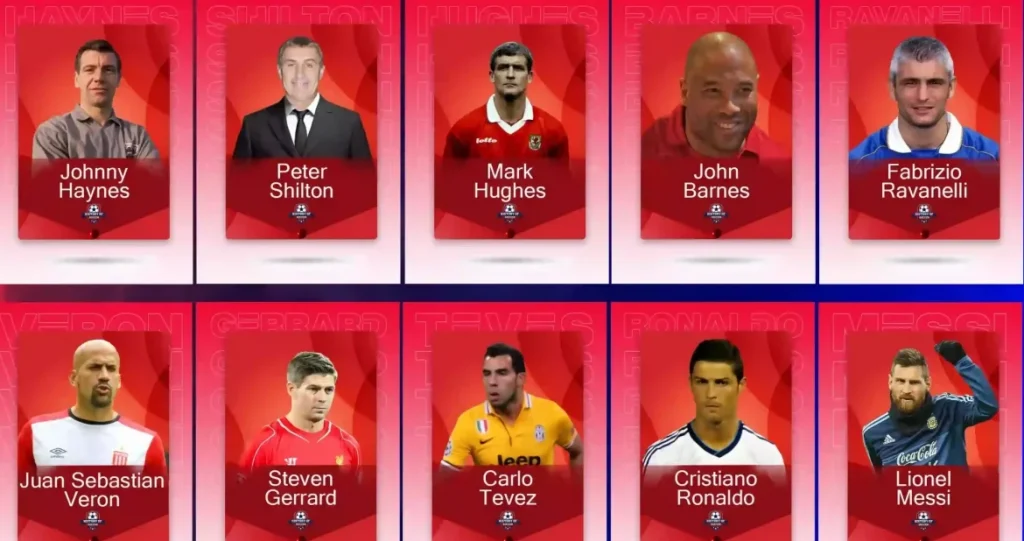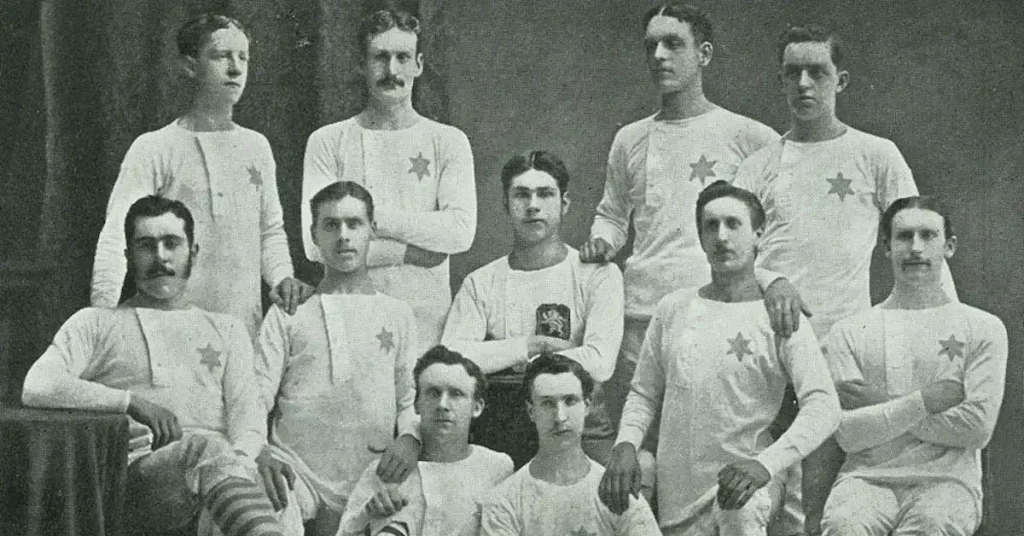Only one player in the history of The Ballon d’Or has won the award whilst playing in the French League. A prolific striker, though seldom uttered in the same sentences as Van Basten or Rivaldo, his career was spent almost entirely in France save for two seasons at Bayern Munich and AC Milan and a year in the fairytale-like city of Brugge. It’s one of the Ballon d’Or’s forgotten winners, Jean Pierre Papin.
A glance at his Wikipedia page, and you’ll find an entry shockingly bare for a Ballon d’Or winner, with his achievement simply a casual mention as if it were a participation trophy.
Yet still, in France, Papin remains a footballing icon. He possessed remarkable goal-scoring instincts and an unmatched ability to find the back of the net. In 1991, he was bestowed with the illustrious Ballon d’Or, recognizing him as the best player in European football, a title he would have dared to dream of when he was young.
The pinnacle of football for 1991, was Jean Pierre Papin. With good reason too. This article delves into Papin’s journey and explores how his exceptional performances led him to capture the coveted accolade.
So… who was he?
Born on November 5, 1963, in Boulogne-sur-Mer, France, Jean-Pierre Papin’s first taste of league football came at INF Vichy (don’t mention the war). He quickly made a name for himself thanks to his eye for goal, earning a transfer to second-division Valenciennes where he made an explosive impact. 15 in 33 age 22 in your first season after stepping up is as good as some of football’s greatest.
Impeccable timing, and lethal finishing abilities: his exploits on the field did not go unnoticed, and in 1986 after scoring a blistering 21 in 33 for Brugge, he joined Marseille. It seems a Fairytale town wasn’t for him.
During his time at Marseille, Papin achieved remarkable feats, both individually and as part of a successful team. He consistently topped the goal-scoring charts, earning him the reputation as one of the most clinical finishers of his generation.
In the 1989-1990 season, he reached astonishing heights by netting 30 goals in just 38 league appearances, helping Marseille clinch the French league title.
European Player of the Year
And in 1991 he received recognition for his ability.
Papin’s prolific form on the domestic front continued to shine in European competitions as well. In the 1990-1991 season, Marseille reached the final of the UEFA Champions League, and Papin played a pivotal role in their success in progressing to the final.
With his knack for finding the net, he scored 9 goals in the tournament across 1991, though sadly Marseille would bottle qualification to the next instalment of the European Cup, as they lost to Sparta Prague, in spite of Papin’s 7 goals across 4 games.
Marseille would fall at the final huddle of the 1991 Champions League final, losing 5-3 on penalties to Red-Star Belgrade, after a long fierce 0-0 battle for 120 arduous minutes.
The Frenchman had a respectable 34 goals and five assists in 49 total games that season. Six of his goals and three assists came in nine European Cup games.
However, Papin was not the favourite to win the award. Far from that, considering Darko Pancev and Red Star’s triumph in the European Cup. That included an incredible goal against Bayern Munich.
Controversy
Being French himself, and the Ballon d’Or being intrinsically a French institution, there were a few eyebrows raised at his victory. Papin was not the favourite to win the award. Far from that, considering Darko Pancev and Red Star’s underdog triumph in the European Cup.
Pancev had lit that year’s competition alight, as he scored game after game, regardless of the giants he faced. In 1991 he was considered one of the best strikers in the world, despite playing in the Serbian league, scoring 84 in 92 games across just 4 seasons in Serbia.
As was Dejan Savićević, who would actually draw in second place with his teammate Pancev, both finishing on 42 points top Papin’s 141 points.
The general consensus among many that were up in arms over that year’s winner, was that Papin was voted for by the many French journalists, who might have a bias for their countrymen. Even failing a legitimate bias, they’d been exposed to much more of Papin’s football, making them well aware of his talent, in turn making them more inclined to vote for him.
Pancev was somewhat of an unknown quantity, outside of his European Cup exploits to many of the Journalists from more established European footballing countries.
The counter arguement would be to say that the Serbian league is much weaker, which is true, but that dismisses a European Cup victory, which is club football’s highest achievement. Pancev and Dejan Savićević were the beating heart of this Red Star side, propelling them past sides of much greater ability.
It was an inspired underdog story, and perhaps deserving of individual recognition for the talismen behind it, particularly as there hadn’t been a big International tournament that year that might inflate Papin’s chances.
The Only Way is Down
After being recognised as Europe’s best player Papin’s career went into somewhat of a downward spiral. The following season, he would keep up his fine performances, as he scored 27 in the league, earning a move to AC Milan in the most competitive league in the world, the Serie A.
Now facing the likes of Matthaus, Roberto Baggio, Ruud Gullit, and Franco Baresi. This was the biggest of the big leagues. Sadly, it didn’t work out for him. Whether hubris, the grass being greener over in Italy, or the allure of a fresh challenge, Papin no longer wanted to be a Marseille player.
But things would never quite gel in Milan.
His first season showed some promise, as he managed 13 in 22 in the league, but after a dismal return of 5 in 18 the next season, he was carted off to Bayern Munich. He would find himself playing second fiddle to a 20-year-old Alexander Zickler, just 3 years after winning a Ballon d’Or.
3 in 12 in all competitions that season would feel like a fall from grace, but 3 in 28 the season after would feel like a descent into mediocrity.
Papin left to return to his homeland, following his disappointing time away, joining a Bordeaux side that had reached the UEFA Cup final the previous season. At 33, he’d have somewhat of a resurgence in form, scoring 16 in 32 in Ligue 1, helping Bordeaux to a 4th-place finish.
The next season would prove to be the nail in his status as a top division player, unable to replicate the same form, with just 6 in 23, he would wind up playing his final season for EA Guingamp, playing a bit-part role in their 7th place finish in Ligue 2.
Papin is a player that will always be celebrated in France as one of their best-ever strikers, but unlike many of his Ballon d’Or-winning compatriots; he will never be seen in the same way as Ronaldo or Cruyff.
In saying that, the same would be said had Darko Pancev won the award, with the Macedonian struggling upon joining Papin’s new rivals Inter Milan. He’d only score 3 in 19 appearances across 3 seasons.
Papin certainly deserved his place in contention for the 1991 Ballon d’Or, but it’s still up to debate as to whether he truly deserved it over Pancev or fellow Red Star teammate Dejan Savićević.
Bias almost certainly played some part, from the almost 99 votes Papin had in 1st, but his victory wasn’t dependent on it. Had he won by a smaller margin, that year’s award might have been far less controversial.
1991 Ballon d’Or Top 20:
| Rank | Name | Nationality | Club(s) | Points |
|---|---|---|---|---|
| 1 | Jean-Pierre Papin | France | Marseille | 141 |
| 2 | Dejan Savićević | Yugoslavia | Red Star Belgrade | 42 |
| Darko Pančev | Yugoslavia | Red Star Belgrade | 42 | |
| Lothar Matthäus | Germany | Internazionale | 42 | |
| 5 | Robert Prosinečki | Yugoslavia | Red Star Belgrade, Real Madrid | 34 |
| 6 | Gary Lineker | England | Tottenham Hotspur | 33 |
| 7 | Gianluca Vialli | Italy | Sampdoria | 18 |
| 8 | Miodrag Belodedici | Romania | Red Star Belgrade | 15 |
| 9 | Mark Hughes | Wales | Manchester United | 12 |
| 10 | Chris Waddle | England | Marseille | 11 |
| 11 | Michael Laudrup | Denmark | Barcelona | 7 |
| 12 | Rudi Völler | Germany | Roma | 5 |
| 13 | Txiki Begiristain | Spain | Barcelona | 3 |
| Stéphane Chapuisat | Switzerland | Borussia Dortmund | 3 | |
| Bruno Martini | France | Auxerre | 3 | |
| Paul McGrath | Republic of Ireland | Aston Villa | 3 | |
| Dean Saunders | Wales | Derby County, Liverpool | 3 | |
| Hristo Stoichkov | Bulgaria | Barcelona | 3 | |
| 19 | Roberto Mancini | Italy | Sampdoria | 2 |
| Marco van Basten | Netherlands | Milan | 2 |
